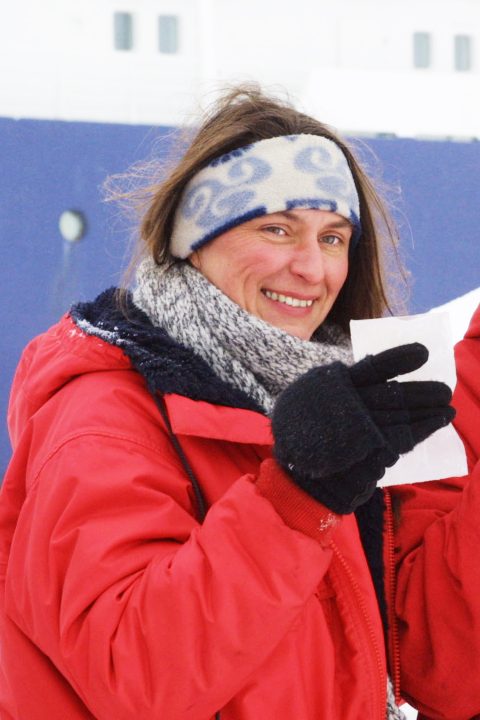Dr. Iris Werner is the central equal opportunities commissioner of Kiel University and head of the central Office for Gender Equality, Diversity and Family. Being a marine biologist by education, she worked more than 20 years in marine and polar ecological research before changing to science management in 2008.

Dr. Iris Werner
What are the main things you enjoy about being a marine scientist?
The greatest experiences for me as a marine scientists were definitely the very exciting, long-lasting, international and interdisciplinary sea-going expeditions I had the privilege to participate in. Being part of such a diverse team on-board, going to places (almost) no one else has been before and discovering some of the many fascinating secrets the ocean still hides from us is fundamentally different from all other jobs I can imagine.
Did you have any role models that led you to this career? How did they influence you?
In the beginning, there was no (female) role model for me. Later in my career as a marine scientist, there was a, in my field of research quite famous, woman scientist from the US who became sort of a role model for me. She influenced me by just being a good example how it could go, even in times and places more difficult than they were for me. With lots of power, longanimity and humour.
What are your main professional achievements? Any/what obstacles?
I would say that my main professional achievement was the establishment of a very engaged and motivated research group with international guest scientists, and the successful support of some early-career young scientists on their way. For a couple of years, we managed to carry out some excellent research projects without a lot of funding. Obstacles were, of course, not sufficient job perspectives, not enough research funding and strategic decisions of the university board to close down our area of research. It took me quite a while to understand how politics influence science.
Have you ever had any difficulties in your career due to your gender? If yes, how did you handle them?
When I started to go on marine research cruises to polar regions as a PhD student, there were no survival suits in female sizes on-board the research vessel. Sounds like a bad joke end of the 20th century, but unfortunately it wasn’t. This changed the day I became group leader. In my group, there have been women and men alike, of course, on some cruises we have even been more women than men. Later in my career I sometimes had the opaque impression that there were some unconscious barriers for me due to my gender, e.g. most of my male colleagues got permanent positions, whereas most of my female colleagues dropped out of science. I handled that in going on to what I was convinced of being my own way.
How can we overcome the issues driving women out of careers in marine science and technology?
I think the most important issue is to make everyone aware of all the unconscious gender bias we all have in the back of our brains. They influence every piece of evaluation, decision and opinion about persons and their scientific and professional performance. There are many good studies showing this.
At the latest, special support for women in science should start in the end of the PhD phase. Many women finish an (excellent) PhD project and leave science after that. This is both a waste of personal achievements for the women themselves, but also a waste of talents for science and for the society as a whole. The most crucial stage for women scientists is between postdoc and professorship or permanent position in science. Here, the most support and awareness is needed.
What actions are foreseen to reduce gender inequalities in your institution?
There are several actions in our institution, such as adopting quotas of 50% women in junior research group leaders and postdocs; ensurance of adequate gender balance (at least 40% women) in all decision-making committees and boards; keeping gender-fair regulation procedures for recruitment of scientists; running mentoring programme for women; code of conduct; organizing of gender awareness trainings and workshops on gender stereotypes for all scientists; support for internationally incoming female scientists and their families.
What is the most effective way for you to maintain balance of your professional and personal life?
I have learnt to be very clear about what I want and in which order of priority. I always had very supportive supervisors and chefs. In my family life, all duties and benefits are equally shared between partners. In the end, it is very important not to forget what it is all about – having the life you want to have as much as possible.
What advice would you give any women considering science as a career path?
Keep up with your dreams and aims, but be aware that you also need a strategic approach to reach them. Don’t wait for someone discovering you and your abilities – go out and show them at the right places and times. Look out for everything that could help you on your professional way (support structures, funding opportunities, networks, cooperation partners, mentors) and take your chance.